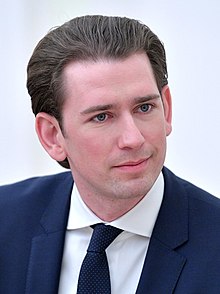
Back Sebastian Kurz Afrikaans Sebastian Kurz AN سيباستيان كورتس Arabic سيباستيان كورتز ARZ Sebastian Kurts Azerbaijani Sebastian Kurz BAN Sebastian Kurz BAR Себасцьян Курц Byelorussian Сэбастыян Курц BE-X-OLD Себастиан Курц Bulgarian
Sebastian Kurz | |
|---|---|
 Kurz in 2018 | |
| 26th Chancellor of Austria | |
| In office 7 January 2020 – 11 October 2021 | |
| President | Alexander Van der Bellen |
| Vice-Chancellor | Werner Kogler |
| Preceded by | Brigitte Bierlein |
| Succeeded by | Alexander Schallenberg |
| In office 18 December 2017 – 28 May 2019 | |
| President | Alexander Van der Bellen |
| Vice-Chancellor | Heinz-Christian Strache Hartwig Löger |
| Preceded by | Christian Kern |
| Succeeded by | Brigitte Bierlein |
| Chairman of the People's Party | |
| In office 14 May 2017 – 3 December 2021 | |
| Preceded by | Reinhold Mitterlehner |
| Succeeded by | Karl Nehammer |
| Minister of Foreign Affairs | |
| In office 16 December 2013 – 18 December 2017 | |
| Chancellor | Werner Faymann Christian Kern |
| Preceded by | Michael Spindelegger |
| Succeeded by | Karin Kneissl |
| Personal details | |
| Born | 27 August 1986 Meidling, Vienna, Austria |
| Political party | People's Party (2003–present) |
| Domestic partner | Susanne Thier |
| Children | 1 |
| Parents |
|
| Residence(s) | Meidling, Vienna |
| Education | GRG 12 Erlgasse (Matura) |
| Cabinet | |
| Signature |  |
| Website | |
| Military service | |
| Allegiance | |
| Branch/service | |
| Years of service | 2004–2005 |
| Unit | Maria Theresa's Barracks |
| Part of a series on |
| Conservatism in Austria |
|---|
 |
Sebastian Kurz (German: [zeˈbasti̯a(ː)n ˈkʊrts]; born 27 August 1986) is an Austrian former politician who served twice as the 26th chancellor of Austria, initially from December 2017 to May 2019 and then a second time from January 2020 to October 2021. On 23 February 2024, Kurz received an eight-month suspended sentence after being convicted of perjury by a court in Vienna over his involvement in a parliamentary inquiry.[1]
Kurz was born and raised in Meidling, Vienna. He entered politics by joining the Young People's Party (JVP) in 2003 and rose through the ranks there over the following years. As a result of a cabinet reshuffle in 2011, Kurz received his first government mandate as state secretary responsible for socially integrating refugees. After the 2013 legislative election, Kurz became the country's foreign minister and remained its top diplomat until December 2017.
In May 2017, Kurz succeeded ÖVP chairman Reinhold Mitterlehner and ran as chancellor candidate of his party in the 2017 legislative election. He campaigned on modernizing the Austrian political and bureaucratic apparatus as well as handling the social and immigration issues the country was facing after the European refugee crisis. His perceived reformist approach, rhetorical skills and youth were cited as the prime reasons for his landslide victory. Kurz was subsequently charged with forming his first cabinet. He opted for a coalition with the far-right Freedom Party of Austria (FPÖ). During his first chancellorship, Kurz was credited with mostly following through on his campaign pledges, but his leadership style was widely criticised as uncooperative and hasty. Several political scandals, culminating with the Ibiza affair in 2019, ended the ÖVP–FPÖ coalition. As a result of him no longer commanding the support of Parliament, Kurz and his cabinet were ousted.
Following the 2019 snap election, he returned to power and formed a coalition with the environmentalist Green Party this time. Kurz and his second cabinet were inaugurated in January 2020. Their agenda, however, was swiftly put in limbo by the surging COVID-19 pandemic. His response to the pandemic included lockdowns and curfews. An investigation into the Ibiza affair by a parliamentary subcommittee, an unstable Cabinet plagued by resignations, and ultimately a corruption inquiry, forced Kurz to resign the chancellorship in October 2021. However, remaining party chair and parliamentary leader allowed him to retain control over government affairs, and thus he came to be known as "shadow chancellor". Two months later, Kurz quit politics entirely and started working as a global strategist for Peter Thiel.
Kurz was the youngest chancellor in Austrian history as well as the youngest head of government in the world for about four years. His youth and political tenor were credited with revitalizing the traditional conservative movement in Austria and in Europe.